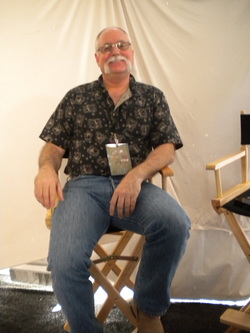
When the whole thing started, it seemed so innocent. Artists who had no money were finally able to find funding for their projects, either through their friends, or a network of strangers that truly believed in what they were doing. People were inventing things, and since they didn't necessarily have the means to put up cash for manufacturing their doo-dads, they found people willing to buy their products and basically front the cash in order to get them made. It was a fantasyland of ideas and wonder. I even found a project recently that was just some guy who wanted to draw cats for people. His enthusiasm was undeniable (who doesn't want a cute drawing of a cat?), but alas, the artistry wasn't quite there, and his project wasn't funded.
So, Kickstarter became a place to find ideas, inventions, and all manner of emerging artists in all sorts of media. And then came Veronica Mars. Veronica Mars the television show lasted for three seasons, then vanished suddenly with very little warning and no fanfare. The series didn't even get the normal series finale that is afforded to most shows. It simply went away. Many fans were outraged. Mind you, this is a rabid bunch. They really can't get enough of their spunky gumshoe (actually, the show was pretty good), and wanted to see her move on to the FBI and 'big time' crimes. They wanted to see Veronica get her guy-- both the criminal and the love interest. But sadly, that never came. For years, there was chatter about a movie, but every time the gossip got off the ground, it quickly got shot down.
Then Rob Marshall (the creator of Veronica Mars) got an idea. He would go straight to the fans. Warner Brothers gave their blessing that if he could raise $2 million, they would support the marketing of the film (which is actually very expensive). So he opened up a Kickstarter campaign, and lo and behold, within 2 days (2 DAYS!) fans had pledged the minimum amount necessary. By the time the campaign ended 30 days later, many Kickstarter records had been broken, Marshall ended up with over $5 million, and it looks like the Veronica Mars movie is a go. But the story doesn't end there.
Then comes Zach Braff. Many people know and love him from the TV show Scrubs. Some remember his film Garden State. And still others revile him for "ruining" Oz. Whatever the case, he decided to jump into the Kickstarter ring. And yet again, we saw a well-known celebrity manage to raise a large amount of money ($2.2 million as of this writing) in a short amount of time (6 days). However, there is a noticeable difference. In Braff's project, no amount of money can buy you a copy of the film on DVD. Or Blu-Ray. For $100 you can see the film in certain cities. For $150 you can even get a copy of Garden State (I guarantee Target has it for much less). So what's the deal?
Normally, when people fund a project, one of the incentives is that they will get a copy of the finished product. Not so in this case. Why? Because Braff wants to sell that, too. You see, big studios pay big money for the rights to distribute movies on DVD and Blu-Ray. So, in effect, Braff gets paid twice. You pay him to make the movie, then you pay to see the movie, then you pay for a copy of the movie. Are you starting to see how this is broken?
On a side note, it is interesting to note that both the Veronica Mars project and Zach Braff's project list being an 'actor' with a spoken line as one of the perks. Meaning, you pay $10,000, they let you say something on camera. Seems legit, right? Except when you realize that they are supposed to pay you for that. There are hundreds, no, thousands of actors out there trying to make a living, and somehow you are supposed to pay for the privilege to say "Here's your check, sir."? Seems like a complete negation of the craft of acting, but this is somewhat debatable (Keanu Reeves, anyone?). Anyway..
So, here's the deal. Has Kickstarter "gone Hollywood"? Is there any room left for regular people who have spectacular ideas? Is fundraising really just like being the prom king or queen, where the person who gets the most money is the one that's also the most popular? Is this how we're going to fund art?
I say this: don't forget about the world of grants. Yes, it is tough. You have to do a lot of writing. But you also have to have a project worth funding. Most grant committees care more about the merit of the work than how many Facebook friends or Twitter followers you have. Or how long you've been in syndication. Maybe we should start a fund for art that is blind to names, that looks at the work instead. Who's with me? Maybe I'll start a Kickstarter campaign to fund a grant that's for real artists. Who will give me $10?
I'd love to hear your take on this.
 RSS Feed
RSS Feed
